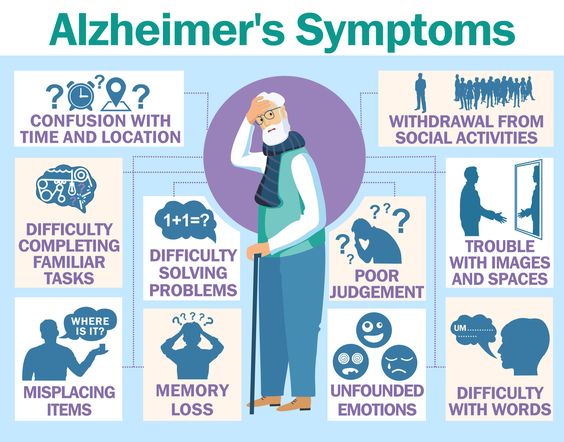The feedback provided with Practice NCLEX Questions allows students to understand the reasoning behind correct and incorrect answers, facilitating deeper learning.
NCLEX Alzheimer's Disease Questions - NCLEX Questions on Alzheimer's Disease
Alzheimer's Disease NCLEX Practice Questions
Question 1.
Mr. Alvin, a 78-year-old male, has recently been diagnosed with Alzheimer's disease. He lives alone and has limited social support. His daughter is his primary caregiver but lives two hours away. Mr. Alvin is forgetful and has become increasingly agitated and irritable in the past few weeks. He has also become more withdrawn and less interested in social and family activities.
Which of the following statements about Mr. Alvin requires nursing intervention? (Select all that apply.)
(a) Administer screening tools for depression and cognitive impairment.
(b) Keep the client functioning and actively involved in social and family activities for as long as possible.
(c) Maintain an orderly, almost ritualistic, schedule to promote a sense of security.
(d) Maintain a regularly scheduled reality orientation on a daily basis.
(e) Keep familiar objects, such as family pictures, in the older adult’s environment to promote a sense of continuity and security.
(f) Administer prescribed drugs to reduce emotional lability, agitation, and irritability or prescribed antidepressant, as indicated.
Answer:
(a) Administer screening tools for depression and cognitive impairment.
(d) Maintain a regularly scheduled reality orientation on a daily basis.
(f) Administer prescribed drugs to reduce emotional lability, agitation, and irritability or prescribed antidepressant, as indicated.
Explanation:
(a) Administer screening tools for depression and cognitive impairment: This statement requires nursing intervention as Alzheimer's disease is associated with cognitive impairment and depression. Screening tools can help identify the extent of the cognitive impairment and depression, allowing the nursing staff to develop appropriate interventions and support for Mr. Alvin.
(b) Keep the client functioning and actively involved in social and family activities for as long as possible: This statement is incorrect as it is important to respect the patient's autonomy and choices. Mr. Alvin may not want to engage in social and family activities due to his cognitive impairment and other factors. It is important to support him in his choices and preferences.
(c) Maintain an orderly, almost ritualistic, schedule to promote a sense of security: This statement is incorrect as it is important to maintain a routine for Mr. Alvin. However, an overly rigid schedule may increase his anxiety and agitation, which can negatively impact his well-being.
(d) Maintain a regularly scheduled reality orientation on a daily basis:
Keep the client oriented as to time, place, and person (repeatedly). Keep a calendar and clock within sight at all times, a. Display a calendar and clock that can be read by the older person (i.e., a clock with large numbers and a calendar that can be read by those with deteriorating vision), b. Be sure the date and time are accurate (i.e., keep the calendar current and the clock in working order).
This statement requires nursing intervention as it is important to maintain Mr. Alvin's orientation to time, place, and person. Keeping a calendar and clock within sight can help him stay oriented and reduce confusion and anxiety.
(e) Keep familiar objects, such as family pictures, in the older adult’s environment to promote a sense of continuity and security: This statement is incorrect as it is important to individualize care for Mr. Alvin. While familiar objects may provide comfort to some patients, others may not find them helpful. It is important to assess Mr. Alvin's preferences and provide care that is tailored to his needs.
(f) Administer prescribed drugs to reduce emotional lability, agitation, and irritability or prescribed antidepressant, as indicated: This statement requires nursing intervention as Alzheimer's disease is associated with emotional lability, agitation, and irritability. Medications may be needed to manage these symptoms and improve Mr. Alvin's quality of life. However, it is important to consider the potential side effects of medication and monitor Mr. Alvin closely.

Question 2.
Mrs. Miranda is a 75-year-old woman who has been diagnosed with a stroke. She has experienced symptoms such as half visual blindness, difficulty recognizing regular objects, altered proprioception, difficulty performing regular activities, and neglect syndrome.
Which of the following nursing interventions would be most appropriate for a patient with stoke?
(a) Monitor the patient's airways, breathing, and circulation and clear their air path if necessary
(b) Administer oxygen as needed to support the patient's respiratory function
(c) Position the patient with their head slightly raised above and to the side to prevent aspiration
(d) Maintain the patient's fluid and electrolyte balance by providing appropriate fluids and monitoring vital signs
Answer:
(a) Monitor the patient's airways, breathing, and circulation and clear their air path if necessary
(b) Administer oxygen as needed to support the patient's respiratory function
(c) Position the patient with their head slightly raised above and to the side to prevent aspiration
(d) Maintain the patient's fluid and electrolyte balance by providing appropriate fluids and monitoring vital signs
Explanation:
All of the options listed in the question are correct answers because they are all mentioned in the case study as nursing interventions for a patient with a stroke. Monitoring the patient's airways, breathing, and circulation, administering oxygen as needed, positioning the patient with their head slightly raised above and to the side to prevent aspiration, and maintaining the patient's fluid and electrolyte balance are all interventions that can help support the patient's recovery and manage their symptoms.
Rationale:
Option (a) Monitor the patient's airways, breathing, and circulation and clear their air path if necessary is a correct answer because this intervention is mentioned in the case study as a way to support the patient's respiratory function and circulation.
Option (b) Administer oxygen as needed to support the patient's respiratory function is a correct answer because this intervention is mentioned in the case study as a way to support the patient's respiratory function.
Option (c) Position the patient with their head slightly raised above and to the side to prevent aspiration is a correct answer because this intervention is mentioned in the case study as a way to prevent aspiration.
Option (d) Maintain the patient's fluid and electrolyte balance by providing appropriate fluids and monitoring vital signs is a correct answer because this intervention is mentioned in the case study as a way to support the patient's overall health and recovery.
Read More:
